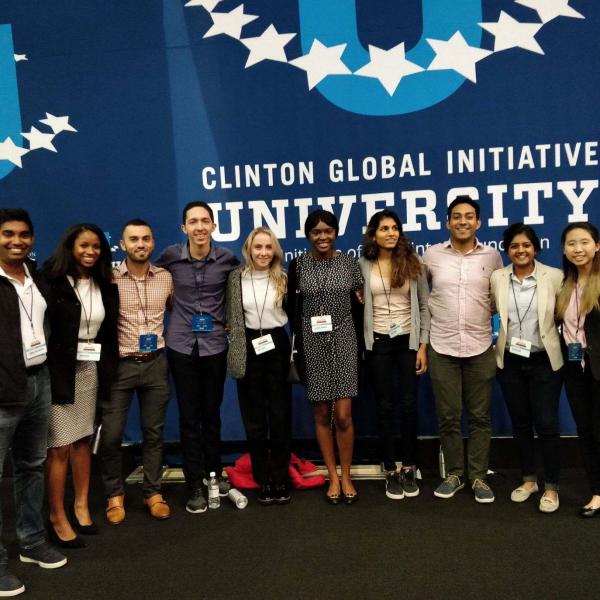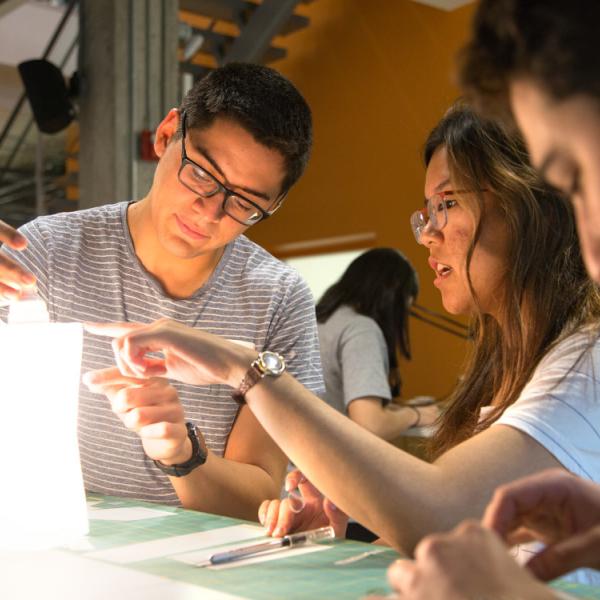Overview
The 2024 CNF REU Program
(Please note that this program is not open to Cornell University students. The CNF REU Program is listed here in Experience Cornell for non-Cornell students and to support the application.)
The Cornell NanoScale Science & Technology Facility will host an in-person Research Experiences for Undergraduates (CNF REU) Program during the summer of 2024, on Cornell University's Ithaca NY campus.
CNF REU Program Dates: Tuesday, June 4 - Friday, August 9, 2024
The CNF REU Program specializes in hiring undergraduate students from two-year colleges, students with no prior research experience, students from those backgrounds that are underrepresented in the STEM fields, and students who are the first in their family to attend college.
Successful applicants are those undergraduates with an educational and personal background in the sciences, especially those who major in STEM fields. Research at CNF encompasses engineering, life sciences, and the physical sciences (descriptions below), and has a strong inter-disciplinary emphasis. We expect our interns to have a basic knowledge in biology, chemistry, electronics and or physics.
Please read the full requirements carefully before starting your application to ensure you are eligible for the CNF REU Program (link above left).
The undergraduates taking part in this ten-week program will receive hands-on nanotechnology-related research experience via projects designed and supervised by faculty and technical staff. Interns participate in CNF’s three-day Technology and Characterization at the Nanoscale short course and receive hands-on training in the CNF cleanroom. Interns then work with their assigned faculty and graduate students using the unique resources offered by the CNF with the intention of becoming an independent member of the research team before the end of the program.
At the end of the program, participants will present their results to their peers in concise scientific presentations both on Cornell campus and at the National Nanotechnology Coordinated Infrastructure (NNCI) REU Convocation at the University of Nebraska-Lincoln.
Finally, CNF REU interns must submit a summer evaluation and complete a written report -- akin to a research paper, summarizing the findings of their research project. These reports are published and distributed to the interns, the National Science Foundation (NSF), and many others.
CNF REU interns receive a $6,000 stipend, plus housing and reasonable travel expenses, including travel to the NNCI REU Convocation in Nebraska. Full participation in the ten-week program, convocations, final reporting, and evaluations are all mandatory.
We look forward to receiving your application materials!
Please note we have TWO DEADLINES! Your online application materials are due Wednesday, February 14, 2024. Your two recommendations are due one week later, by Wednesday, February 21, 2024.
2024 CNF REU Program Research Descriptions
The Cornell NanoScale Science & Technology Facility (CNF) is a national user facility that supports a broad range of nanoscale science and technology projects by providing state-of-the-art resources coupled with expert staff support. CNF has been serving the science and engineering community since 1977. Research at CNF encompasses physical sciences, engineering, and life sciences, and has a strong inter-disciplinary emphasis. Over 600 users per year (50% of whom come from outside Cornell) use the fabrication, synthesis, computation, characterization, and integration resources of CNF to build structures, devices, and systems from atomic to complex length-scales.
We do not provide specific project descriptions, however -- descriptions of our main research topics are below, and past CNF REU intern reports can be found at https://cnf.cornell.edu/education/reu
CNF Chemistry & Chemical Nanotechnology
The most revolutionary part of nanotechnology comes from the manipulation of individual molecules and the building up of functional nanostructures from the bottom up. Examples include self-assembled monolayers, dendrimers, functionalized nanotube structures, etc. Many of the imagined applications in this realm of nanotechnology are far from realization, but a base of technology is forming. Within more traditional areas of chemistry, nanotechnology enables chemical sensors and chemical mixing systems using microfluidics. Chemistry also drives the development of new materials and processes for nanostructure fabrication and synthesis.
CNF Life Sciences & Biomedical Engineering
Nanoscale structures and devices can be used to simulate biological structures, sort or detect cells or molecules, manipulate fluids, or control cell growth, for example. Also, the power of microelectronics and MEMS can be harnessed to fabricate specialized probes for in vivo studies. Surfaces can be modified by patterning or adsorption to change bioactivity, promoting cell growth, attachment, or specialization. When biological material must be deposited or patterned, methods and materials must be bio-compatible. CNF has special facilities and staff expertise for addressing these compatibility issues.
CNF Nanoscale Electronics
Microfabrication has enabled advances in electronics for almost sixty years. With advanced nanotechnology, even more advanced devices are possible. CNF supports both silicon and compound semiconductor systems with feature sizes as small as 10 nm. In addition, novel structures including nanotube devices, spin-based devices, energy sources, plasmonic devices, and single molecule devices have been explored. Integration of electronics with MEMS, optics, and microfluidic devices can result in powerful new functional nanostructure devices.
CNF Optics & Optoelectronics
Nanotechnology makes possible a variety of new optical and optoelectronic structures, including lasers and waveguides, diffraction gratings, optical switches and modulators, photodetectors, and photonic crystals. CNF has extensive experience and appropriate technologies for fabrication of optical structures in materials including silicon, quartz, compound semiconductors, and plastic.
CNF Physics & Nanostructures
Because of the small dimensions, nanotechnology enables direct observation of many quantum phenomena that would not otherwise be possible. Measurements of conductivity of single molecules, conduction through small junctions with few defects, as well as observations of magnetic scattering of spin-polarized currents are possible. High resolution electron-beam lithography (EBL) and sensitive instrumentation including scanned probe microscopies enable many of these experiments. CNF houses advanced Electron Beam Lithography systems that can be used to pattern features and gaps as small as 10 nm. Combining unique material layers with the nanofabrication processes in CNF, researchers can explore behavior of devices as they are scaled tens of nanometer in size.
IN ADDITION!
We are "adopting" two or three summer interns for the following program funded by the Cornell Robert Frederick Smith School of Chemical and Biomolecular Engineering and hosted as part of the CNF REU Program:
FMRG: Cyber: Scalable Precision Manufacturing of Programmable Polymer Nanoparticles Using Low-temperature Initiated Chemical Vapor Deposition Guided by Artificial Intelligence
Polymer nanoparticles have a broad range of significant applications, including drug delivery, soft robotics and nanomedicine, etc. However, existing manufacturing of such materials are limited by batch production, quality variability and a narrow range of particle functionality, resulting in a slow development cycle, often decade long, for new materials, recipes, and use at scale. To enable a future technology in manufacturing versatile polymer nanoparticles, it is necessary to radically change such a paradigm into one that enables data-driven decision-making for processing conditions. This unique future manufacturing research grant (FMRG) will advance fundamental research in the principles for continuous and highly reproducible manufacturing of polymer nanoparticles with an expanded palette of sizes, shapes and chemical functionalities for wide-ranging applications in various industries. The new paradigm for the studied cyber-manufacturing of polymer nanoparticles will be achieved through critical breakthroughs in chemical-vapor-deposition based continuous synthesis and in-line characterization of polymeric nanostructures, integrated using artificial intelligence (AI)-guided selections of complex processing conditions. This research, if successful, will unlock vast design space for future nanomedicine, with a potential to substantially impact the healthcare industry and improve the quality of life of the society by and large.
All completed CNF REU applications will be considered for this additional program, but feel free to add a note to your essay if the FMRG: Cyber Program is of particular interest to you!






